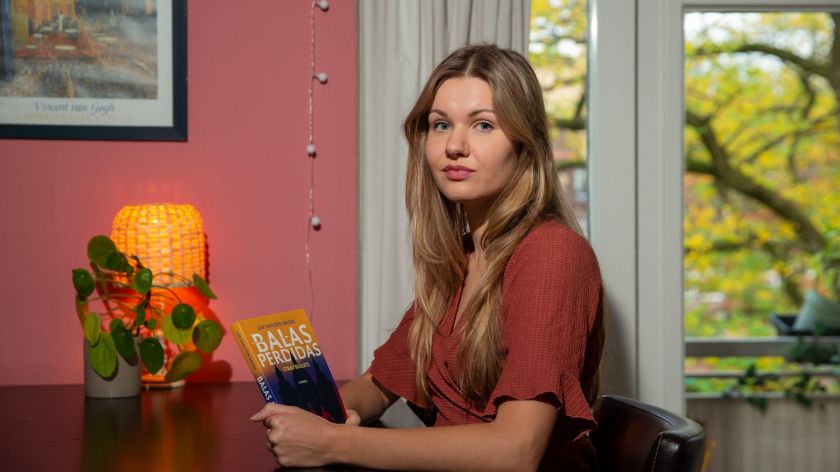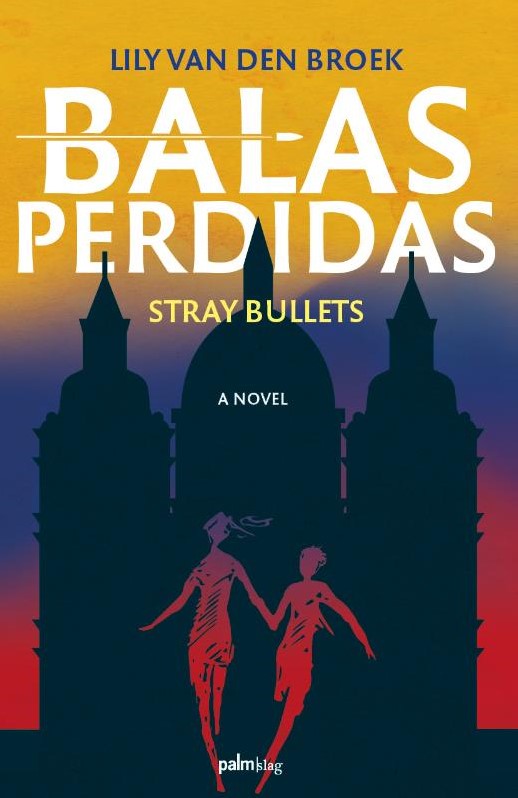Student writes a novel about war violence in Colombia as master thesis
-
 Lily van den Broek. Photo: David van Haren
Lily van den Broek. Photo: David van Haren
Former master’s student Lily van den Broek did research on Colombian families affected by war violence for her thesis. She assembled the stories she encountered during her research in a novel. ‘At times, I had to stop writing for a while.’
Please note: this article contains excerpts on sexual violence.
In the most incisive excerpt of the book Balas Perdidas by former master’s student Lily van den Broek, the Colombian Martina, together with other young girls in her village, is rounded up by paramilitary troops and forced to watch the corpses of a number of raped girls. Finally, Martina sees the lifeless body of her sister.
“They told us to go home and warn our families: this was what would happen to us, to our sisters and our mothers, if we didn’t leave right then. The men… they just laughed. ‘Don’t worry, little girl’, they said. ‘She was a whore, she deserved to die.’ I screamed that she wasn’t a whore. I screamed that they were the ones who deserved to die. I didn’t think. I couldn’t think.”

Based on a true story
Balas Perdidas, the book by former master’s student Lily van den Broek, is about a Colombian family fleeing from the war violence in their country. Although the book is a novel – and thus fiction – the passage above did truly happen. Balas Perdidas, Spanish for stray bullets, is based on the many personal stories the 26-year-old student encountered during her research on displaced families in the South American country.
‘I can’t read the excerpt myself anymore’, says Van Den Broek. She puts her cup of coffee down on the table in front of her and sighs. ‘My fingers start shaking again.’
Where many students would prefer to be rid of their thesis as soon as possible, Van den Broek chose to do it completely different for her Conflict, Territories and Identities master’s. Two years ago, the student travelled to Colombia to do research and give English lessons at a school. On her days off, she spoke to Colombians who had to flee from war violence.
‘Whatever side you chose in the conflict, you ended up a victim’
Colombia has seen long years of armed conflict. Guerrillas of the FARC fought in full force with the government and other paramilitary groups. Since the 2016 peace accords, the intensity of the fighting has subsided, but millions of people are still displaced.
On all sides of the conflict, existing war laws were violated; human rights were not safeguarded. ‘Life was impossible for a regular citizen. Whatever side you chose, you ended up a victim. Remaining completely neutral was the only option’, Van den Broek explains. ‘And even then, you could be seen as a traitor.’
‘Sadly Colombia quickly went into a complete lockdown due to COVID’, says Van den Broek. ‘I managed to book one of the last flights out of the country, but because of that I had to do a lot of interviews while in the Netherlands. Those were conducted via Skype, or through voice memos on WhatsApp.’
Horrible stories
Van den Broek has always had a love for the Spanish language and cultures. ‘And I am a bit of an activist by nature. When I heard the terrible stories about war violence in Colombia, I immediately knew I wanted to do something with that. I wanted their story to be known in the Netherlands too, but a thesis gets lost in a heap of other academic literature. Because of that I chose to write a book.’
The novel does differ slightly from her actual thesis. For instance, scientific frameworks and methodological justifications are missing from the final book. However, it does contain footnotes to scientific references.
‘At times, I had tears in my eyes while writing’
Writing the book was not always easy. ‘At times, I had tears in my eyes while writing. The stories people told really struck me. People whose families was abducted, raped, or murdered. The fear, the uncertainty.’ There is a moment of silence, and she shakes her head. ‘It is unthinkable what some people experienced over there.’
Although the book is finished, Van den Broek still remains much concerned with Colombia. ‘Ideally, I want the injustice done to the people there to stop. But it remains incredibly difficult, because I can’t do much myself, especially being so far away. There is a woman with whom I spoke a lot about her situation, but since a few weeks it remains quiet. I can no longer get in touch. I hope she is doing well, but I fear the worst…’
Balas Perdidas will be available from Friday at various bookshops for 21,95 euros. It will also hit the shelves of Dekker van de Vegt. The book is written in English.
Translated by Jan Scholten



